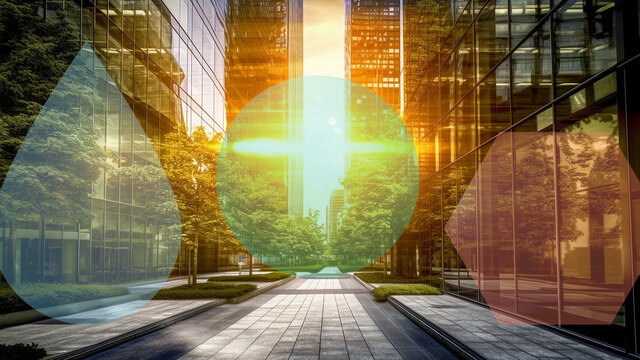We know that with the available water resources on Earth, we can no longer feel safe. What areas of our life are affected by water shortage?
Water, as we know, is the basic natural resource without which life on Earth would not be possible. The shortages of usable water affect our functioning holistically. Of course, the priority is drinking water, but without access to water, we cannot produce food. Another example is energy. Butan and Norway focus on the so-called hydroelectric power plants, which - in order to function - need infrastructure built on rivers. Droughts or undesirable weather phenomena such as storms and global warming disturb the rhythm of the river. It’s a big problem. When I was in Georgia I experienced an event that illustrates its consequences. Global warming has caused glaciers to melt faster. During the heavy rainfall that hit the country at that time, a piece of the glacier broke off and fell into the river, causing a flood and completely destroying the bridge and the local power plant. We also need water to cool machines in power plants or in the mining industry, e.g. in the production of biofuels from biological materials. Due to the connection between energy and water, problems with one imply problems with the other. In some places, in order to use energy we need a lot of water and water resources are limited or other sectors are competing for them. There, problems arise that affect the economy as a whole.
What is food security in the age of global problems: climate change, soil depletion, or deforestation?
The current situation in Europe, the war in Ukraine, the theft of grain by the Russians, or blocking of ports are just the tip of the iceberg, which slowly opens our eyes and makes us realize how sensitive our society is to disruptions in supply chains. We live in a rich continent and so far we were unaware of the impending catastrophe, and food security was disrupted long before the war. Having mastered the cultivation of wheat, mankind passionately developed agriculture and monocultures. It is raising single species and the lack of diversification that make us sensitive to changes. Only recently have we started to realize that when we deforest huge areas on different continents, we are disrupting the ecosystem, depleting the soil, and contributing to more frequent climatic disasters. In view of these changes, current methods of food production will be insufficient in time. Primary production, cereal crops, and livestock farming use the most water in the world compared to other sectors of the economy. We should focus on this problem and implement new methods that are more environmentally friendly. I believe we are able to do this. We must use all our technological potential to reform the current systems.
What can we do about all the food security problems we face?
Above all, we need to redefine food as such for our society. In Europe, but also in the United States, for example, we have learned that we have an abundance of food and that it is relatively cheap. From the moment of the rapid population growth after World War II, in order to meet the population challenges, we began to produce food that is cheap, easy to store, and in large quantities. It seemed like a good solution at the time, but we started to notice that such food is unhealthy, highly processed, and we are paying a huge environmental price for it. A side effect is an epidemic of civilization diseases. In Europe, more people die from overeating than from starvation. This, in turn, causes increasing social and economic problems. Huge amounts of food are wasted while in African countries there is a shortage of it. To stop this spiral, we need to understand that food is a basic good that must be cared for and respected. Changes in thinking result in real behavioral changes. More and more funds are being invested in the food sector, specifically in technology companies that implement modern technologies and tools. Thanks to them, it is possible to produce and process food in a sustainable way and not waste what we have available. I am convinced that at a time when we can view photos of Mars taken by the rover sent there, we also have tools that will revolutionize any industry. We just need to think about them.
What is the role of aquaculture and hydroponics in addressing these problems?
In my opinion, aquaculture, hydroponics, and aquaponics are systems that can significantly influence the way we produce and perceive food. Especially in the context of closed circuits - it is a key factor that reduces water consumption in food production. The numbers speak for themselves: it takes more than 15,000 liters of water to produce 1 kg of beef. Meanwhile, to produce 1 kg of salmon, we only need 400-700 liters of water, depending on the method. Moreover, the carbon footprint of cattle is almost 10 times higher than that of salmon grown in aquaculture. It is worth knowing that well-constructed aquaculture or hydroponic farms are isolated from the external environment and do not cause pollution or soil depletion. Moreover, such isolation means that the environment does not affect the culture, so that pathogens, pesticides, antibiotics, and other substances that we do not want to eat do not get into it. The combination of aquaculture and hydroponics gives aquaponics, in which, in addition to the water cycle, we also have a biomass cycle: feces excreted by animals and food residues are converted into fertilizer for plants grown in the same system. Such a fertilizer is properly balanced, and most importantly - natural. Aquaponic farms have a chance to function in places where access to water is limited. With the skillful combination of these methods with modern solutions in the field of renewable energy, we can build a unique system that will be independent of external conditions.
You were a jury member at Aquathon. Do you think that water hackathons are needed and can provide interesting solutions to implement?
Yes, I had the pleasure to participate in the last edition of Aquathon. I believe that such initiatives have great potential. First, they educate the public and spread knowledge about water shortages and their consequences. Secondly, it is an incubator of talents that come up with non-obvious ideas. When we give a chance to participants who don’t have to meet any industry or knowledge requirements, we can expect interdisciplinary ideas that inspire action.
The reality related to water is not optimistic. Do you see any chances for us to save the water situation?
I do - and these are good chances. Fortunately, there is a growing public awareness of this problem, which is more than half the battle and a key factor in implementing changes. There are more and more initiatives related to the reduction of water consumption in various industries, as well as to saving water resources. Of course, it takes money, but in this case, one drives the other. It seems to me that we are on the verge of a food revolution that will change our perception of ourselves in terms of the resources at our disposal. In order to keep up with changes, broadly understood cooperation is necessary; cooperation in which the 3W Idea is involved: both at the operational level - creating interdisciplinary teams and projects, and at the strategic level: between government and local government agencies, scientists, entrepreneurs, and other decision-makers.




